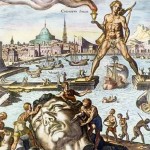On the Shoulders of Giants
 I’ve often heard the term, “You are what you eat.” I suspect that some of that may be true. If you’ve read Michael Pollan’s “The Omnivore’s Dilemma” you may conclude that we are more corn than anything else. The book is insightful and fascinating beyond expectations. While there is a case for taking the eating phrase literally, I take from it a more important meaning, that we are what our minds eat. What we feed ourselves with eyes, ears, travel and experiences defines more of what we are. All other species eat, but we digest so much more. Well, many of us do.
I’ve often heard the term, “You are what you eat.” I suspect that some of that may be true. If you’ve read Michael Pollan’s “The Omnivore’s Dilemma” you may conclude that we are more corn than anything else. The book is insightful and fascinating beyond expectations. While there is a case for taking the eating phrase literally, I take from it a more important meaning, that we are what our minds eat. What we feed ourselves with eyes, ears, travel and experiences defines more of what we are. All other species eat, but we digest so much more. Well, many of us do.
I will confess that, next to conjuring up dishes in the kitchen, reading is my favorite food. I cannot imagine being competent enough to add a scintilla of value, were it not for the gifts of insight and knowledge that others have shared through their writing. History is among my most favorite topics, but not the memorized stories of yesteryear, repeated with rote by some. History is a thinking, contextual, situational and transformative experience. History is most fun when we can connect the dots across the economic, scientific, social, military, medical, climatologically… etc … landscapes. How the little ice age changed choices and migrations, the acts of a few changing the world for many, how the black plague defined today’s gene pool in the UK, why some Irish are black haired and the fate of the Spanish Armada. And best of all, all the “what if” questions we should always ask.
The bigger stories are almost never told first. Conquistadors and European adventures into the new world claim superiority over native cultures, but do not give true credit to all the diseases that did all the dirty work for them. But the biggest benefit from history is that it provides context and a framework for evaluating what is ahead. An appreciation of the complexity of events helps remove the blinders of oversimplification and linearity we may have been fed. It helps us think a lot better about how to make choices and decisions within a broader framework. It makes us smarter.
We are currently working through the devastation precipitated by the failures of some of our economic systems. We want things to get better, and we hope there is a solution. We are trying to specifically fix the problems within our enterprises, and we hope there is a solution. The appeal of a simple answer that we can implement within the world we know and we believe we can control is really appealing. History warns us about myopia; particularly about the stuff we don’t see and assume does not affect us.
The best lesson from well written history is the one that recognizes what happened from luck, chance, randomness, accident, diseases, weather, ignorance, mistake and the infinite number of causes over the view that a particular decision or a particular hero or villain did it all and determined the fate of man or an enterprise. Good history gives to us the skeptical eye and gives us bandwidth for decision making. It reminds us that the world is not what can be defined in a few dimensions, but rather many more. It reminds us that were are not as clever as we think and not nearly as prolific in original thought as we may claim.
In responding to a letter from a scientific rival Robert Hooke, Sir Isaac Newton wrote; “If I have seen a little further it is by standing on the shoulders of Giants.”

